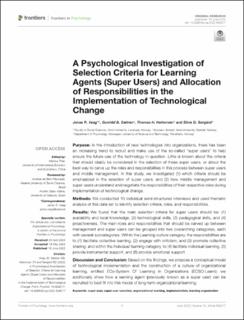| dc.contributor.author | Vaag, Jonas Rennemo | |
| dc.contributor.author | Sætren, Gunhild Birgitte | |
| dc.contributor.author | Halvorsen, Thomas Haugeli | |
| dc.contributor.author | Sørgård, Stine Dalen | |
| dc.date.accessioned | 2023-02-27T15:49:39Z | |
| dc.date.available | 2023-02-27T15:49:39Z | |
| dc.date.created | 2022-05-19T08:30:30Z | |
| dc.date.issued | 2022 | |
| dc.identifier.citation | Frontiers in Psychology. 2022, 13 . | en_US |
| dc.identifier.issn | 1664-1078 | |
| dc.identifier.uri | https://hdl.handle.net/11250/3054399 | |
| dc.description.abstract | Purpose: In the introduction of new technologies into organizations, there has been an increasing trend to recruit and make use of the so-called “super users” to help ensure the future use of the technology in question. Little is known about the criteria that should ideally be considered in the selection of these super users, or about the best way to carve up the roles and responsibilities in this process between super users and middle management. In this study, we investigated (1) which criteria should be emphasized in the selection of super users, and (2) how middle management and super users understand and negotiate the responsibilities of their respective roles during implementation of technological change.
Methods: We conducted 10 individual semi-structured interviews and used thematic analysis of this data set to identify selection criteria, roles, and responsibilities.
Results: We found that the main selection criteria for super users should be: (1) availability and local knowledge, (2) technological skills, (3) pedagogical skills, and (4) proactiveness. The main roles and responsibilities that should be carved up between management and super users can be grouped into two overarching categories, each with several subcategories. Within the Learning culture category, the responsibilities are to (1) facilitate collective learning, (2) engage with criticism, and (3) promote collective sharing; and within the Individual learning category, to (4) facilitate individual learning, (5) provide instrumental support, and (6) provide emotional support.
Discussion and Conclusion: Based on the findings, we propose a conceptual model of technological implementation and the construction of a culture of organizational learning, entitled ECo-System Of Learning in Organizations (ECSO-Learn); we additionally show how a learning agent (previously known as a super user) can be recruited to best fit into this model of long-term organizational learning. | en_US |
| dc.language.iso | eng | en_US |
| dc.publisher | Frontiers | en_US |
| dc.relation.uri | https://www.frontiersin.org/articles/10.3389/fpsyg.2022.928217/abstract | |
| dc.rights | Navngivelse 4.0 Internasjonal | * |
| dc.rights.uri | http://creativecommons.org/licenses/by/4.0/deed.no | * |
| dc.title | A Psychological Investigation of Selection Criteria for Learning Agents (Super Users) and Allocation of Responsibilities in the Implementation of Technological Change | en_US |
| dc.title.alternative | A Psychological Investigation of Selection Criteria for Learning Agents (Super Users) and Allocation of Responsibilities in the Implementation of Technological Change | en_US |
| dc.type | Peer reviewed | en_US |
| dc.type | Journal article | en_US |
| dc.description.version | publishedVersion | en_US |
| dc.source.pagenumber | 14 | en_US |
| dc.source.volume | 13 | en_US |
| dc.source.journal | Frontiers in Psychology | en_US |
| dc.identifier.doi | 10.3389/fpsyg.2022.928217 | |
| dc.identifier.cristin | 2025428 | |
| cristin.ispublished | true | |
| cristin.fulltext | original | |
| cristin.qualitycode | 1 | |

